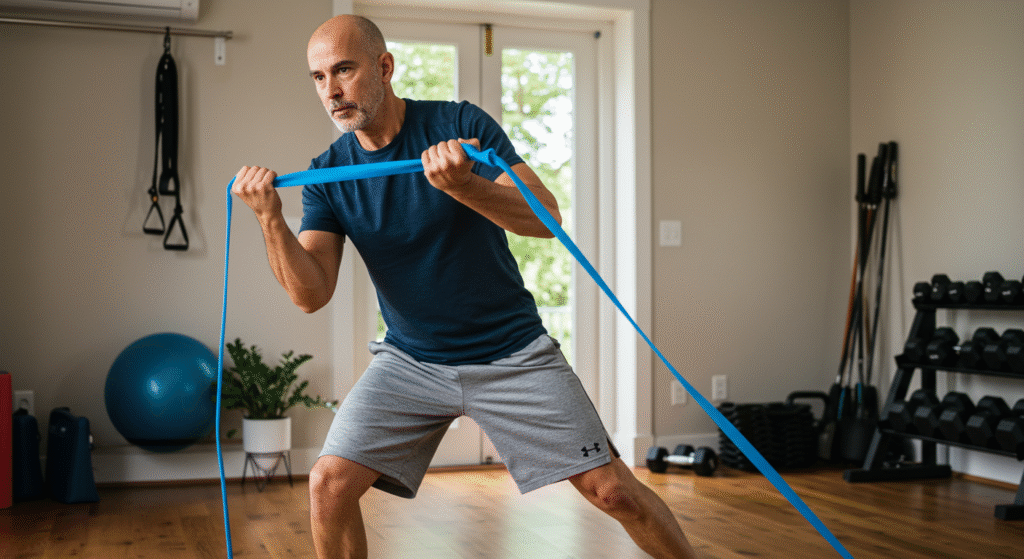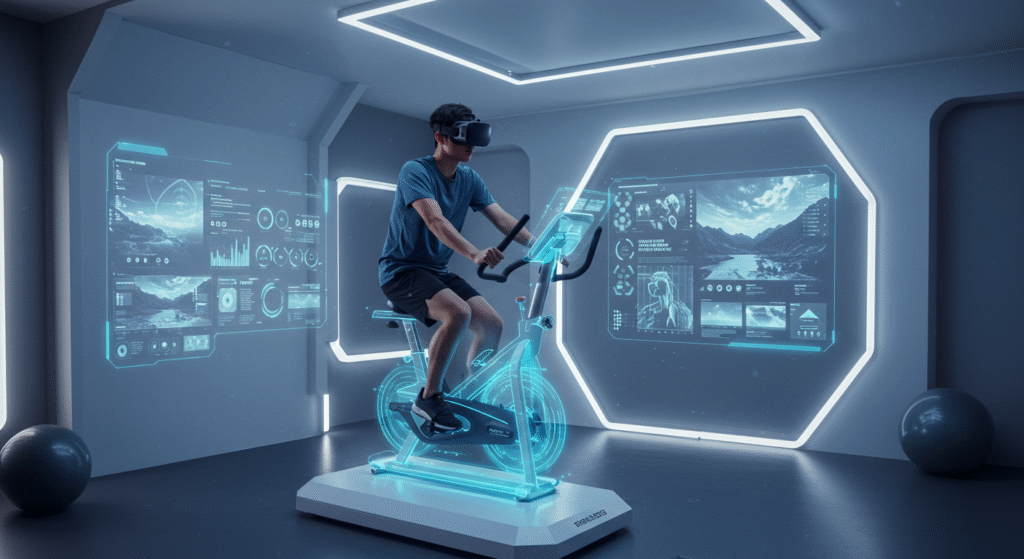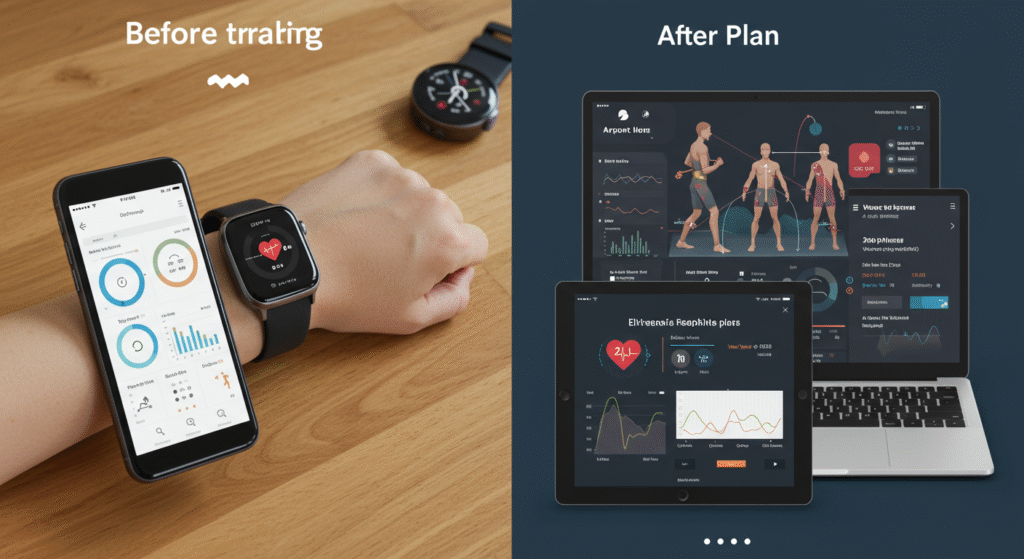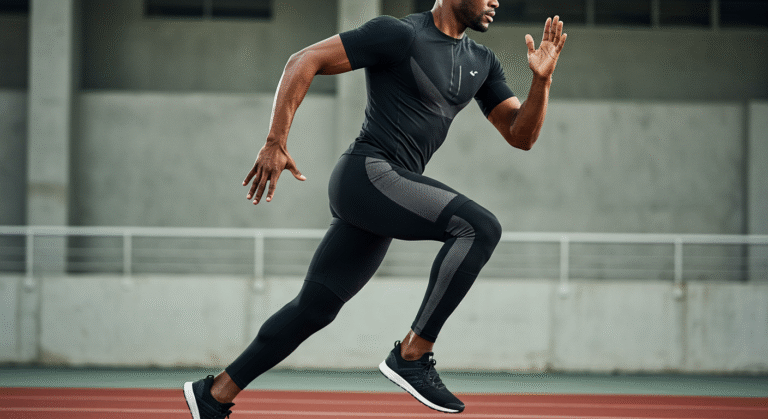Meta Description: Discover how AI fitness coaching is revolutionizing personalized workouts in 2025. From adaptive training to real-time feedback, explore the future of smart fitness technology.
Remember when getting a personalized workout meant paying hundreds for a personal trainer or following generic routines from a magazine? Those days feel ancient now. I was talking to my neighbor Sarah last week – she’s been using an AI fitness app for three months, and honestly, I barely recognized her transformation. Not just physically, but the confidence radiating from her was incredible.
That conversation got me thinking about how dramatically AI has changed the fitness landscape in 2025. We’re not just talking about fancy gadgets anymore; we’re witnessing a complete revolution in how technology understands our bodies, learns from our movements, and adapts to our unique needs. If you’ve been curious about AI fitness coaching but weren’t sure where to start, you’re in for a treat.
The Science Behind AI-Powered Personal Training
AI fitness technology in 2025 leverages hyper-personalized algorithms that integrate advanced artificial intelligence to provide highly customized fitness experiences. These systems analyze vast amounts of data from various sources to create truly individualized workout recommendations.
What makes this so revolutionary? Traditional fitness programs follow a one-size-fits-all approach. Your AI fitness coach, however, considers everything from your sleep patterns and stress levels to your previous workout performance and even your menstrual cycle if you’re a woman. It’s like having a personal trainer who never forgets a detail about your fitness journey.
I’ve been testing the Amazfit Balance Smart Watch for the past month, and the accuracy is mind-blowing. This device tracks everything – heart rate variability, sleep quality, recovery metrics – and feeds that data into AI algorithms that adjust my workouts daily. Some mornings it’ll suggest a lighter yoga session when it detects I haven’t fully recovered from yesterday’s HIIT workout. Other days, when my metrics show I’m primed for intensity, it pushes me with challenging strength circuits.

Real-Time Form Correction and Injury Prevention
Here’s where things get really exciting. AI tools now use motion capture and biometric data to assess fitness levels, posture, and movement patterns in minutes, providing quick and accurate evaluations along with data-driven insights.
My friend Jake, who’s a physical therapist, was initially skeptical about AI form correction. Then he tried an app that uses his phone’s camera to analyze his squats in real-time. “It caught a hip shift I didn’t even realize I was doing,” he told me. “The app not only corrected my form but explained why that compensation pattern could lead to lower back issues down the road.”
This technology isn’t just about perfecting your technique – it’s about preventing injuries before they happen. The AI analyzes your movement patterns over time, identifying subtle changes that might indicate overuse or compensation patterns developing. It’s like having a physical therapist watching every rep, which frankly, makes me feel a lot safer pushing my limits.
For anyone serious about form and injury prevention, I’ve been loving the TRX ALL-IN-ONE Suspension Trainer Bundle from Amazon. What’s brilliant about this setup is how it forces you to engage stabilizing muscles while the AI coaching apps can better analyze your movement patterns through the controlled, bodyweight-based exercises.
Adaptive Training Programs That Evolve With You
AI algorithms can adjust workout plans in real time through adaptive training programs, leveraging sophisticated algorithms to create highly personalized workout experiences. This isn’t just about changing the number of reps or sets – we’re talking about complete program modifications based on how your body responds.
Last month, I was dealing with some shoulder tightness from too much desk work. Instead of me having to manually adjust my workouts, my AI coach detected the issue through decreased range of motion data from my wearable device. Within 24 hours, it had modified my entire program, incorporating shoulder mobility work and adjusting upper body exercises to promote healing rather than aggravation.
The most impressive part? The AI doesn’t just react to problems – it predicts them. By analyzing patterns in your performance data, sleep quality, and recovery metrics, it can often identify when you’re heading toward overtraining before you feel it yourself.

Integration with Wearable Technology and Biometric Data
Wearable technology continues to be the number one fitness trend, with the field constantly advancing to provide better integration with AI coaching systems. The synergy between your devices and AI coaching has reached a level that honestly feels like science fiction.
I recently upgraded to the Garmin Venu 3, and the integration with AI coaching platforms is seamless. The Garmin Venu 3 features robust sleep tracking with nap detection and fitness coaching that surpasses what other companies offer, including mic and speaker capabilities for calls and smart assistant support.
What I love most is how it tracks recovery during sleep and automatically adjusts the next day’s workout intensity. Poor sleep quality? The AI might recommend a gentle yoga flow instead of that planned strength session. Excellent recovery metrics? Get ready for a challenging workout that’ll push your limits safely.
The data integration goes beyond just fitness metrics too. Some AI platforms now consider external factors like weather (suggesting indoor alternatives when it’s too hot), your calendar (lighter workouts on busy days), and even social factors (group workout suggestions when it detects you’ve been exercising alone frequently).
Nutritional Guidance Powered by Machine Learning
AI fitness coaching in 2025 extends far beyond exercise programming. The nutritional guidance has become incredibly sophisticated, analyzing not just your caloric needs but how different foods affect your performance and recovery.
My AI coach recently suggested increasing my magnesium intake after analyzing sleep quality patterns and workout recovery data. It wasn’t just a generic supplement recommendation – it provided specific food sources, optimal timing, and even tracked how the changes affected my sleep scores over the following weeks.
The meal planning integration is where I see the biggest time savings. Based on my workout schedule, dietary preferences, and performance goals, the AI generates weekly meal plans that actually taste good and fit my lifestyle. No more spending Sunday afternoons meal prepping without a clear strategy.

Looking Ahead: The Future of AI Fitness Coaching
Future projections suggest that AI will bring VR and AR exercise experiences, genetic analysis, and advanced injury prevention to the forefront of fitness solutions. We’re already seeing early implementations of virtual reality workouts that transport you to different environments while maintaining the personalized coaching experience.
Genetic analysis integration is particularly exciting. Imagine AI that doesn’t just learn from your workout data but understands your genetic predispositions for power vs. endurance training, injury susceptibility, and optimal recovery protocols. We’re probably only 12-18 months away from this becoming mainstream.
The gamification elements are evolving too. Instead of simple step counters and achievement badges, AI systems are creating complex, personalized challenges that adapt to your psychological motivators. Some people thrive on competition, others on personal progress tracking, and AI is getting incredibly good at identifying and leveraging these individual preferences.

Getting Started with AI Fitness Coaching
If you’re ready to dive into AI fitness coaching, start simple. Don’t feel like you need to invest in the most expensive technology right away. Many excellent AI coaching apps work with basic fitness trackers or even just your smartphone.
For beginners, I’d recommend starting with a quality fitness tracker that integrates well with AI platforms. The Amazfit Active 2 has been getting rave reviews for its $99 price point and excellent AI coaching integration. The Amazfit Active 2 delivers formidable performance and features for just $99, works with both iPhone and Android, and has up to 10 days of battery life.
The key is consistency. AI systems need data to provide personalized recommendations, so commit to wearing your device and logging workouts for at least 2-3 weeks. You’ll start seeing the magic happen as the AI learns your patterns and begins making increasingly accurate predictions and suggestions.

The transformation Sarah experienced wasn’t just about having access to better workouts – it was about having a coaching system that truly understood her as an individual. AI fitness coaching in 2025 isn’t replacing the human element of fitness; it’s amplifying it by providing personalized insights that would be impossible to achieve manually.
Whether you’re a complete beginner or a seasoned athlete, there’s never been a better time to explore AI fitness coaching. Start with one piece of wearable technology, commit to consistent use, and prepare to be amazed at how quickly the AI learns your patterns and begins optimizing your fitness journey.
Ready to meet your new AI fitness coach? Try tracking your workouts for a week with any AI-enabled fitness app – I guarantee you’ll be surprised by the insights it provides about your exercise patterns and recovery needs. The future of fitness is personal, and it’s available right now.
Recommended Products:
- Amazfit Balance Smart Watch – Top-rated for accuracy and AI integration
- TRX ALL-IN-ONE Suspension Trainer Bundle – Perfect for AI form analysis
- Garmin Venu 3 – Advanced biometric tracking with superior AI coaching
Affiliate disclosure: This post contains affiliate links. If you purchase through these links, we may earn a small commission at no additional cost to you.




